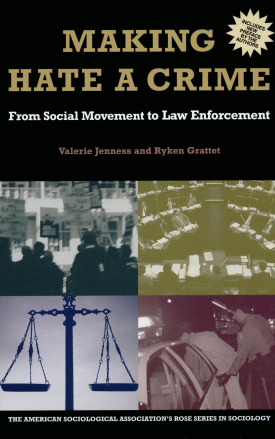

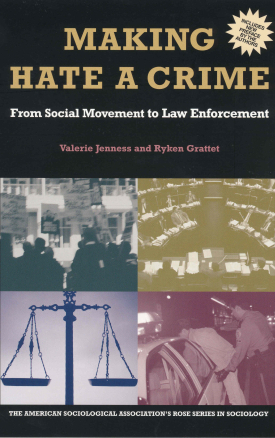
Making Hate a Crime
About This Book
A Volume in the American Sociological Association’s Rose Series in Sociology
Winner of the 2002 Outstanding Scholarship Award from the Crime and Delinquency Section of the Society for the Study of Social Problems
Violence motivated by racism, anti-Semitism, misogyny, and homophobia weaves a tragic pattern throughout American history. Fueled by recent high-profile cases, hate crimes have achieved an unprecedented visibility. Only in the past twenty years, however, has this kind of violence—itself as old as humankind—been specifically categorized and labeled as hate crime. Making Hate a Crime is the first book to trace the emergence and development of hate crime as a concept, illustrating how it has become institutionalized as a social fact and analyzing its policy implications.
In Making Hate a Crime Valerie Jenness and Ryken Grattet show how the concept of hate crime emerged and evolved over time, as it traversed the arenas of American politics, legislatures, courts, and law enforcement. In the process, violence against people of color, immigrants, Jews, gays and lesbians, women, and persons with disabilities has come to be understood as hate crime, while violence against other vulnerable victims-octogenarians, union members, the elderly, and police officers, for example-has not. The authors reveal the crucial role social movements played in the early formulation of hate crime policy, as well as the way state and federal politicians defined the content of hate crime statutes, how judges determined the constitutional validity of those statutes, and how law enforcement has begun to distinguish between hate crime and other crime. Hate crime took on different meanings as it moved from social movement concept to law enforcement practice. As a result, it not only acquired a deeper jurisprudential foundation but its scope of application has been restricted in some ways and broadened in others. Making Hate a Crime reveals how our current understanding of hate crime is a mix of political and legal interpretations at work in the American policymaking process. Jenness and Grattet provide an insightful examination of the birth of a new category in criminal justice: hate crime. Their findings have implications for emerging social problems such as school violence, television-induced violence, elder-abuse, as well as older ones like drunk driving, stalking, and sexual harassment. Making Hate a Crime presents a fresh perspective on how social problems and the policies devised in response develop over time.
VALERIE JENNESS is associate professor and chair of criminology, law, and society, as well as associate professor of sociology at the University of California, Irvine.
RYKEN GRATTET is associate professor of sociology at the University of California, Davis.
RSF Journal
View Book Series
Sign Up For Our Mailing List
Apply For Funding
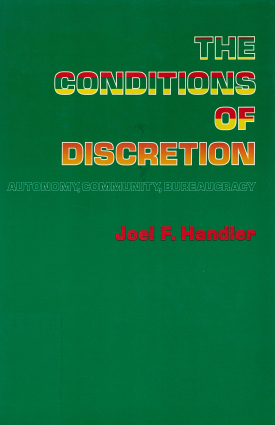
The Conditions of Discretion
About This Book
This timely book is concerned with interactions between ordinary people and large public bureaucracies—interactions that typically are characterized by mutual frustration and antagonism. In fact, as Joel Handler points out, the procedural guidelines intended to ensure fairness and due process fail to take account of an initial imbalance of power and tend to create adversarial rather than cooperative relationships.
When the special education needs of a handicapped child must be determined, parents and school administrators often face an especially painful confrontation. The Conditions of Discretion focuses on one successful approach to educational decision making (developed by the school district of Madison, Wisconsin) in order to illustrate how such interactions can be restructured and enhanced. Madison’s creative plan regards parents as part of the solution, not the problem, and uses “lay advocates” to turn conflict into an opportunity for communication. Arrangements such as these, in Handler’s analysis, exemplify the theoretical conditions under which discretionary decisions can be made fairly and with the informed participation of all concerned.
The Conditions of Discretion offers not only a detailed case study, sympathetically described, but also persuasive assessments of major themes in contemporary legal and social policy—informed consent, bureaucratic change, social movement activity, the relationship of the individual to the state. From these strands, Handler weaves a significant new theory of cooperative decision making that integrates the public and the private, recognizes the importance of values, and preserves autonomy within community.
"A masterful blend of social criticism, social sciences, and humane, constructive thought about the future of the welfare state." —Duncan Kennedy, Harvard Law School
JOEL F. HANDLER is professor of law at the University of California, Los Angeles.
Download
RSF Journal
View Book Series
Sign Up For Our Mailing List
Apply For Funding
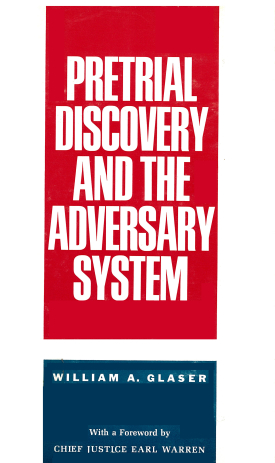
Pretrial Discovery and the Adversary System
About This Book
Presents the results of the first national field survey of how lawyers use pretrial discovery in practice. Pretrial discovery is a complex set of rules and practices through which the adversaries in a civil dispute are literally allowed to "discover" the facts and legal arguments their opponents plan to use in the trial, with the purpose of improving the speed and quality of justice by reducing the element of trickery and surprise. Dr. Glaser examines the uses, problems, and advantages of discovery. He concludes that it is in wide use in federal civil cases, but that while the procedure has produced more information in some areas, it has failed to bring other improvements favored by its original authors.
WILLIAM A. GLASER is at the Bureau of Applied Social Research and The Project for Effective Social Research at Columbia University.
RSF Journal
View Book Series
Sign Up For Our Mailing List
Apply For Funding
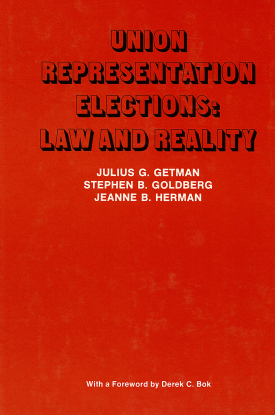
Union Respresentation Elections
About This Book
Provides the first major effort to test the rules and regulations that underlie current practices in union elections and, at the same time, explores the role played by the National Labor Relations Board in regulating these elections. The book reports the findings of an empirical field study of thirty-one union representation elections involving over 1,000 employees to determine their pre-campaign attitudes, voting intent, actual vote, and the effect of the campaign on voting. It focuses on campaign issues, unlawful campaigning, working conditions, demographic factors, job-related variables, and other topics.
JULIUS G. GETMAN is professor of law at Stanford and Indiana Universities.
STEPHEN B. GOLDBERG is professor of law at Northwestern University.
JEANNE B. HERMAN is associate professor of organizational behavior at the Graduate School of Management, Northwestern University.
Download
RSF Journal
View Book Series
Sign Up For Our Mailing List
Apply For Funding
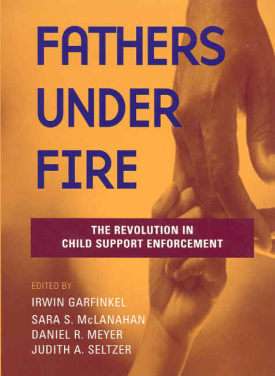
Fathers Under Fire
About This Book
"This important and highly informative collection of studies on nonresidentfathers and child support should be of great value to scholars and policymakers alike." —American Journal of Sociology
Over half of America's children will live apart from their fathers at some point as they grow up, many in the single-mother households that increasingly make up the nation's poor. Federal efforts to improve the collection of child support from fathers appear to have little effect on payments, and many critics have argued that forcing fathers to pay does more harm than good. Much of the uncertainty surrounding child support policies has stemmed from a lack of hard data on nonresident fathers. Fathers Under Fire presents the best available information on the financial and social circumstances of the men who are at the center of the debate. In this volume, social scientists and legal scholars explore the issues underlying the child support debate, chief among them on the potential repercussions of stronger enforcement.
Who are nonresident fathers? This volume calls upon both empirical and theoretical data to describe them across a broad economic and social spectrum. Absentee fathers who do not pay child support are much more likely to be school dropouts and low earners than fathers who pay, and nonresident fathers altogether earn less than resident fathers. Fathers who start new families are not significantly less likely to support previous children. But can we predict what would happen if the government were to impose more rigorous child support laws? The data in this volume offer a clearer understanding of the potential benefits and risks of such policies. In contrast to some fears, stronger enforcement is unlikely to push fathers toward. But it does seem to have more of an effect on whether some fathers remarry and become responsible for new families. In these cases, how are subsequent children affected by a father's pre-existing obligations? Should such fathers be allowed to reduce their child support orders in order to provide for their current families? Should child support guidelines permit modifications in the event of a father's changed financial circumstances? Should government enforce a father's right to see his children as well as his obligation to pay support? What can be done to help under- or unemployed fathers meet their payments? This volume provides the information and insight to answer these questions.
The need to help children and reduce the public costs of welfare programs is clear, but the process of achieving these goals is more complex. Fathers Under Fire offers an indispensable resource to those searching for effective and equitable solutions to the problems of child support.
IRWIN GARFINKEL is M. I. Ginsberg Professor of Continuing Urban Problems in the School of Social Work at Columbia University.
SARA S. MCLANAHAN is professor of sociology and public affairs at Princeton University.
DANIEL R. MEYER is associate professor in the School of Social Work at the University of Wisconsin, Madison, and an affiliate of the Institute for Research on Poverty.
JUDITH A. SELTZER is professor of sociology at the University of California, Los Angeles.
CONTRIBUTORS: Irwin Garfinkel, Sara S. McLanahan, Daniel R. Meyer, Judith A. Seltzer, David E. Bloom, Anne Case, Cecilia Conrad, Fred Doolittle, Richard B. Freeman, Thomas L. Hanson, Martha Minow, Jessica Pearson, Nancy Thoennes, and Jane Waldfogel
Download
RSF Journal
View Book Series
Sign Up For Our Mailing List
Apply For Funding
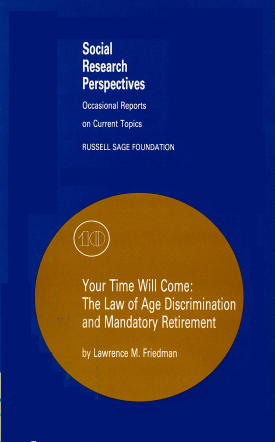
Your Time Will Come
About This Book
Age discrimination and its corollary, mandatory retirement, are modern legal issues, barely a generation old. In this concise and readable report, Lawrence Friedman explores the apparently sudden emergence of a field of law that pertains mainly to the elderly and middle-aged.
Friedman traces the brief but fascinating social, legislative, and judicial history of age discrimination law and of the laws addressing mandatory retirement. Both histories contain paradoxes and contradictions; both seem simultaneously to make an issue of "age" and to demand a kind of age neutrality, reflecting broad recent changes in American culture. Both histories are intricately bound up with other legal issues—age discrimination with race and sex discrimination; mandatory retirement with the development of pension plans and other social insurance systems. Friedman speculates on the impact of these new laws, illuminating through his analysis the complex phenomenon of "legalization," or the penetration of legal norms into ever more areas of life.
Finally, Friedman offers a provocative conclusion in which he suggests that laws on age discrimination and retirement—laws that appear to have a less extensive social background than one would expect—may in fact be "stand-in" laws for vague but powerful social norms not yet recognized in the legal system.
Your Time Will Come is the first new volume in a special paperback series entitled Social Research Perspectives: Occasional Reports on Current Topics. These Perspectives represent a revival of the Social Science Frontiers series published by the Foundation from 1969 to 1977 and will again offer short, timely, and accessible reports on various aspects of social science research.
LAWRENCE M. FRIEDMAN is Marion Rice Kirkwood Professor of Law at Stanford University.
A Volume in the the Russell Sage Foundation's Social Science Perspectives Series
RSF Journal
View Book Series
Sign Up For Our Mailing List
Apply For Funding
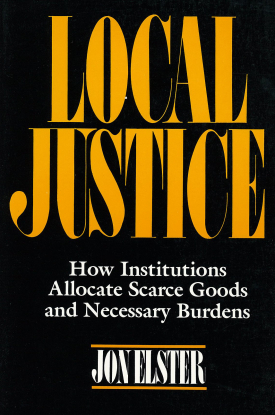
Local Justice
About This Book
The well-being of individuals routinely depends on their success in obtaining goods and avoiding burdens distributed by society. Local Justice offers the first systematic analysis of the principles and procedures used in dispensing "local justice" in situations as varied as the admission of students to college, the choice of patients for organ transplants, the selection of workers for layoffs, and the induction of men into the army. A prominent theorist in the field of rational choice and decision making, Jon Elster develops a rich selection of empirical examples and case studies to demonstrate the diversity of procedures used by institutions that mete out local justice. From this revealing material Elster fashions a conceptual framework for understanding why institutions make these crucial allocations in the ways they do.
Elster's investigation discloses the many complex and varied approaches of such decision-making bodies as selective service and adoption agencies, employers and universities, prison and immigration authorities. What are the conflicting demands placed on these institutions by the needs of applicants, the recommendations of external agencies, and their own organizational imperatives? Often, as Elster shows, methods of allocation may actually aggravate social problems. For instance, the likelihood that handicapped or minority infants will be adopted is further decreased when agencies apply the same stringent screening criteria—exclusion of people over forty, single parents, working wives, and low-income families—that they use for more sought-after babies.
Elster proposes a classification of the main principles and procedures used to match goods with individuals, charts the interactions among these mechanisms of local justice, and evaluates them in terms of fairness and efficiency. From his empirical groundwork, Elster builds an innovative analysis of the historical processes by which, at given times and under given circumstances, preferences become principles and principles become procedures. Local Justice concludes with a comparison of local justice systems with major contemporary theories of social justice—utilitarianism, John Rawls's A Theory of Justice, Robert Nozick's Anarchy, State, and Utopia—and discusses the "common-sense conception of justice" held by professional decision makers such as lawyers, economists, and politicians. The difference between what we say about justice and how we actually dispense it is the illuminating principle behind Elster's book.
A perceptive and cosmopolitan study, Local Justice is a seminal work for all those concerned with the formation of ethical policy and social welfare—philosophers, economists, political scientists, health care professionals, policy makers, and educators.
JON ELSTER is Edward L. Ryerson Distinguished Service Professor of Political Science and Philosophy at the University of Chicago.
Download
RSF Journal
View Book Series
Sign Up For Our Mailing List
Apply For Funding
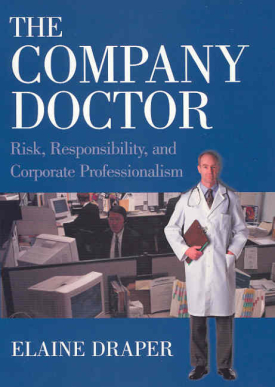
The Company Doctor
About This Book
To limit the skyrocketing costs of their employees' health insurance, companies such as Dow, Chevron, and IBM, as well as many large HMOs, have increasingly hired physicians to supervise the medical care they provide. As Elaine Draper argues in The Company Doctor, company doctors are bound by two conflicting ideals: serving the medical needs of their patients while protecting the company's bottom line. Draper analyzes the advent of the corporate physician both as an independent phenomenon, and as an index of contemporary culture, reaching startling conclusions about the intersection of corporate culture with professional autonomy.
Drawing on over 100 interviews with company physicians, scientists, and government and labor officials, as well as historical, legal, and statistical sources and medical trade association data, Draper presents an illuminating overview of the social context and meaning of professional work in corporations. Draper finds that while medical journals, speeches, and ethical codes proclaim the independent professional judgment of corporate physicians, the company doctors she interviewed often expressed anguish over the tightrope they must walk between their patients' health and the corporate oversight they face at every turn. Draper dissects the complex position occupied by company doctors to explore broad themes of doctor-patient trust, employee loyalty, privacy issues, and the future direction of medicine. She addresses such controversial topics as drug screening and the difficult position of company doctors when employees sue companies for health hazards in the workplace.
Company doctors are but one example of professionals who have at times ceded their autonomy to corporate management. Physicians provide the prototypical professional case for exploring this phenomenon, due to their traditional independence, extensive training, and high levels of prestige. But Draper expands the scope of the book—tracing parallel developments in the law, science, and technology—to draw insightful conclusions about changing conditions in the professional workplace, as corporate cultures everywhere adapt to the new realities of the global economy. The Company Doctor provides a compelling examination of the corporatization of American medicine with far-reaching implications for professionals in many other fields.
ELAINE DRAPER is a visiting scholar at the Institute for the Study of Social Change, University of California, Berkeley, and assistant professor of sociology at California State University, Los Angeles.
Download
RSF Journal
View Book Series
Sign Up For Our Mailing List
Apply For Funding
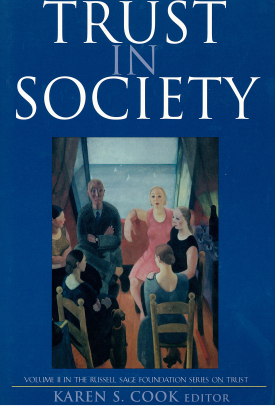
Trust in Society
About This Book
Trust plays a pervasive role in social affairs, even sustaining acts of cooperation among strangers who have no control over each other's actions. But the full importance of trust is rarely acknowledged until it begins to break down, threatening the stability of social relationships once taken for granted. Trust in Society uses the tools of experimental psychology, sociology, political science, and economics to shed light on the many functions trust performs in social and political life. The authors discuss different ways of conceptualizing trust and investigate the empirical effects of trust in a variety of social settings, from the local and personal to the national and institutional.
Drawing on experimental findings, this book examines how people decide whom to trust, and how a person proves his own trustworthiness to others. Placing trust in a person can be seen as a strategic act, a moral response, or even an expression of social solidarity. People often assume that strangers are trustworthy on the basis of crude social affinities, such as a shared race, religion, or hometown. Likewise, new immigrants are often able to draw heavily upon the trust of prior arrivals—frequently kin—to obtain work and start-up capital.
Trust in Society explains how trust is fostered among members of voluntary associations—such as soccer clubs, choirs, and church groups—and asks whether this trust spills over into other civic activities of wider benefit to society. The book also scrutinizes the relationship between trust and formal regulatory institutions, such as the law, that either substitute for trust when it is absent, or protect people from the worst consequences of trust when it is misplaced. Moreover, psychological research reveals how compliance with the law depends more on public trust in the motives of the police and courts than on fear of punishment.
The contributors to this volume demonstrate the growing analytical sophistication of trust research and its wide-ranging explanatory power. In the interests of analytical rigor, the social sciences all too often assume that people act as atomistic individuals without regard to the interests of others. Trust in Society demonstrates how we can think rigorously and analytically about the many aspects of social life that cannot be explained in those terms.
KAREN S. COOK is the Ray Lyman Wilbur Professor of Sociology at Stanford University.
CONTRIBUTORS: Michael Bacharach, Jean Ensminger, Diego Gambetta, Robert Gibbons, Russell Hardin, Carol A. Heimer, Jack Knight, Roderick M. Kramer, Gerry Mackie, David M. Messick, Gary Miller, Victor Nee, Jimy Sanders, Dietlind Stolle, Tom R. Tyler, Toshio Yamagishi.
A Volume in the Russell Sage Foundation Series on Trust
RSF Journal
View Book Series
Sign Up For Our Mailing List
Apply For Funding
Pagination
- Previous page
- Page 17
- Next page
